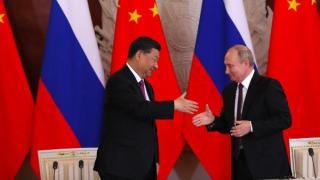COVID-19 is a challenge that needs to be addressed at the global level, despite the very real differences in the strategic aims and domestic politics of the major players in the international system.
On the international cooperation front, one of the most striking threads in news reports and commentary on the pandemic has been the origin, direction, and size of aid and relief efforts. These are not, as it may first seem, a welcome sign of solidarity among nations, but more a harbinger of growing major power rivalry.
Since the international system appears to have become more perilously multipolar than ever in the post-war era, the provision of aid and trade in medical goods is seen as yet another realm of contestation for those who want to challenge the status quo.
Not a day passes without yet another tally of who sent medical supplies, equipment, and experts to whom and how quickly. Since the international system appears to have become more perilously multipolar than ever in the post-war era, the provision of aid and trade in medical goods is seen as yet another realm of contestation for those who want to challenge the status quo. In that vein, the deeds of ‘bad Samaritans’ such as China and Russia as of late have been justifiably scrutinised.
There is no doubt both of these states are instrumentalising their contribution to relief efforts in a manner that complements the pursuit of their broader geopolitical goals. Both have a vested interest in furthering a narrative of the collapse of the existing international order.
Furthermore, those who have traditionally been in the driver’s seat of global public goods provision, such as the United States and the European Union, no longer appear willing or able to take the lead. Recent developments in Europe are perhaps the most telling case of these dynamics.
Those who have traditionally been in the driver’s seat of global public goods provision, such as the United States and the European Union, no longer appear willing or able to take the lead.
In March, in a televised address Serbia’s president Aleksandar Vucic dismissed European solidarity as “a fairy-tale” and singled out China as the only country that “can help us in this difficult situation.” Soon after that, European Union Commission President Ursula von der Leyen thanked China for offering to provide medical supplies to European states.
These stories, along with those of China’s aid and fast-track exports to Europe’s most severely affected nations, such as Italy and Spain, have been reverberating around European and world capitals. It did not take long before Russia followed suit, albeit with substantially smaller relief packages, but with an unmatched ability to capitalise on its nuggets of goodwill.
Ever since there has been a lot of handwringing about China’s and Russia’s actions. Clearly, the leaders of these two states are driven by motives other than charity and altruism. Yet, the relief-tracking exercise poses a serious moral conundrum.
As the pandemic ramps up and each day brings stark new evidence of the severe strain even the major developed nations are under, the talk of geopolitical competition appears to be a quaint luxury reserve for those who are fortunate enough not to have fallen ill.
If we posit there is such a thing as undesirable aid in times when some of the largest European economies are reeling, who has the right to ask them to refuse it? The easy part of the answer is – those who are ready to offer an alternative.
The hard part, however, concerns putting it into practice. In this sense, aid-tracking that focuses on China’s and Russia’s largesse in Europe has missed the mark on three important counts.
China and Russia have mostly been successful in their aid-related PR in recipient states where the domestic politics and conditions preceding the pandemic have enabled them to be portrayed as the saviours.
First, China and Russia have mostly been successful in their aid-related PR in recipient states where the domestic politics and conditions preceding the pandemic have enabled them to be portrayed as the saviours.
For instance, Serbia’s Vucic has taken a page from the European Union’s authoritarians such as Hungary’s Viktor Orban. He is Europhilic when he can extract benefits from the EU, and Eurosceptic when there are higher bidders in town.
In a different example, in order to boost its lacklustre economic growth, Italy has been getting closer to China, which explains why it became the first G7 state to sign on to the Belt and Road Initiative in 2019. It has also been one of the leading European voices for a rapprochement with Russia, from well before the pandemic.
Second, the narrative that reinforces the stereotypes of the European Union as a whole being disjointed and lagging in response does not account for several vital counterpoints. It is rightly held to a greater account than external powers getting involved in crisis mitigation.
However, it is imperative to note there is no common European health policy because organising and delivering public health care is exclusively in the purview of member states’ national governments. This creates a paradox whereby the EU was better equipped to come to China’s aid when the outbreak began in Hubei province than it was mobilising as a collective to help its member-states when COVID-19 came to Europe.
Lastly, there is the issue of soft power build-up. Even if the premise that foreign aid is primarily an instrument in topping up China’s and Russia’s soft power caches holds, it neglects the size of that aid, and the fact European Union member states have by far accounted for the largest share of aid within the Union’s borders.
This pandemic has only reaffirmed the European Union’s long-standing issue with getting bad press in times of crisis. Clearly, this is not a problem that can be solved with the colourful data visualisations and apologetic statements the European Commission has published in the aftermath.
Yet, it only highlights the control over the narrative that the bad Samaritans have, especially given their authoritarian nature. Moreover, it points to some of the pre-set reporting schemas in the European and international media.
After all, the apparent lack of European solidarity regularly receives more coverage than the instances of inter-governmental cooperation.
There is no escaping the hard truth that China and Russia are determined not to let this crisis go to waste. It is a unique opportunity to paint themselves as the white knights, even when their aid turns out to be faulty, and when it comes with an invoice attached.
Yet, what is more worrying is not understanding the deep-seated problems that have enabled the bad Samaritans to assert themselves in such a prominent way. For the COVID-19 pandemic has merely amplified existing worrying trends, rather than created a distinct set of new challenges.






